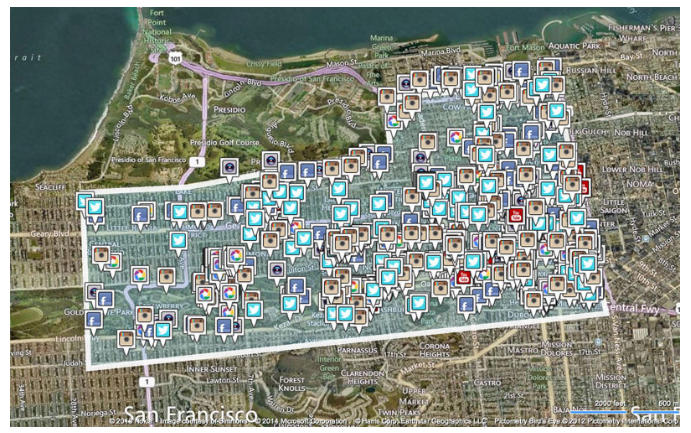

Social media companies provided data to law enforcement surveillance programs during protests in Ferguson and Baltimore, reports the Washington Post.
Twitter, Facebook, and Instagram gave user information, including location details, to Geofeedia, “a Chicago-based company that says it analyzes social media posts to deliver surveillance information to 500 law enforcement agencies,” reported the Post. It was the ACLU of California that obtained records about the relationship, according to a blog post published early Tuesday.
Geofeedia seems to have an explicit interest in shutting down activists and protestors while actively invading their privacy. From a September ACLU of Northern California post reviewing documents obtained by FOIA:
Geofeedia’s marketing materials […] refer to unions and activist groups as “overt threats,” and suggest the product can be used in ways that target activists of color.
In one exchange with law enforcement, a company representative suggested to San Jose Police that they should use the product to surveil the “Ferguson situation,” even though the city is roughly 2,000 miles from Ferguson, Missouri. San Jose Police did in fact use Geofeedia software to monitor South Asian, Muslim, and Sikh protesters only a few days after acquiring it.
An email to the San Diego Sheriff touts a “collection” of social media content curated by Geofeedia following the non-indictment of Darren Wilson.
And yet another promotional email invites the Los Angeles District Attorney to learn how Baltimore used the software to monitor and “stay one step ahead of the rioters” after the police killing of Freddie Gray.
The Post notes that after the ACLU informed the companies that they were aware of their collaboration with Geofeedia, they tried to scale back Geofeedia’s access to user information.
According to today’s ACLU post, “Instagram cut off Geofeedia’s access to public user posts, and Facebook has cut its access to a topic-based feed of public user posts.” In addition, this morning, Twitter tweeted “Based on information in the @ACLU’s report, we are immediately suspending @Geofeedia’s commercial access to Twitter data.”
The controversy highlights some of the continuing problems with social media companies and access to data. From the ACLU:
Social media companies and their executives have expressed support for activists, movements, and free speech. Mark Zuckerberg endorsed Black Lives Matter and expressed sympathy after Philando Castile’s killing, which was broadcast on Facebook Live. Twitter’s CEO Jack Dorsey went to Ferguson. Above all, the companies articulate their role as a home for free speech about important social or political issues.
Yet there is a severe disconnect between these positions and the data access they have provided.
Beyond the agreements with Geofeedia, we are concerned about a lack of robust or properly enforced anti-surveillance policies. Neither Facebook nor Instagram has a public policy specifically prohibiting developers from exploiting user data for surveillance purposes. Twitter does have a “longstanding rule” prohibiting the sale of user data for surveillance as well as a Developer Policy that bans the use of Twitter data “to investigate, track or surveil Twitter users.” Publicly available policies like these need to exist and be robustly enforced.
The ACLU has requested that social media companies refrain from allowing data access to developers with law enforcement clients, refrain from gathering surveillance data including political, social, and religious views, location data, and demographic information. They have also requested that social media companies “adopt clear, public, and transparent policies to prohibit developers from exploiting user data for surveillance purposes” and “institute both human and technical auditing mechanisms designed to effectively identify potential violations of this policy.”
Social media companies provided data to law enforcement surveillance programs during protests in Ferguson and Baltimore, reports the Washington Post.
Twitter, Facebook, and Instagram gave user information, including location details, to Geofeedia, “a Chicago-based company that says it analyzes social media posts to deliver surveillance information to 500 law enforcement agencies,” reported the Post. It was the ACLU of California that obtained records about the relationship, according to a blog post published early Tuesday.
Geofeedia seems to have an explicit interest in shutting down activists and protestors while actively invading their privacy. From a September ACLU of Northern California post reviewing documents obtained by FOIA:
Geofeedia’s marketing materials […] refer to unions and activist groups as “overt threats,” and suggest the product can be used in ways that target activists of color.
In one exchange with law enforcement, a company representative suggested to San Jose Police that they should use the product to surveil the “Ferguson situation,” even though the city is roughly 2,000 miles from Ferguson, Missouri. San Jose Police did in fact use Geofeedia software to monitor South Asian, Muslim, and Sikh protesters only a few days after acquiring it.
An email to the San Diego Sheriff touts a “collection” of social media content curated by Geofeedia following the non-indictment of Darren Wilson.
And yet another promotional email invites the Los Angeles District Attorney to learn how Baltimore used the software to monitor and “stay one step ahead of the rioters” after the police killing of Freddie Gray.
The Post notes that after the ACLU informed the companies that they were aware of their collaboration with Geofeedia, they tried to scale back Geofeedia’s access to user information.
According to today’s ACLU post, “Instagram cut off Geofeedia’s access to public user posts, and Facebook has cut its access to a topic-based feed of public user posts.” In addition, this morning, Twitter tweeted “Based on information in the @ACLU’s report, we are immediately suspending @Geofeedia’s commercial access to Twitter data.”
The controversy highlights some of the continuing problems with social media companies and access to data. From the ACLU:
Social media companies and their executives have expressed support for activists, movements, and free speech. Mark Zuckerberg endorsed Black Lives Matter and expressed sympathy after Philando Castile’s killing, which was broadcast on Facebook Live. Twitter’s CEO Jack Dorsey went to Ferguson. Above all, the companies articulate their role as a home for free speech about important social or political issues.
Yet there is a severe disconnect between these positions and the data access they have provided.
Beyond the agreements with Geofeedia, we are concerned about a lack of robust or properly enforced anti-surveillance policies. Neither Facebook nor Instagram has a public policy specifically prohibiting developers from exploiting user data for surveillance purposes. Twitter does have a “longstanding rule” prohibiting the sale of user data for surveillance as well as a Developer Policy that bans the use of Twitter data “to investigate, track or surveil Twitter users.” Publicly available policies like these need to exist and be robustly enforced.
The ACLU has requested that social media companies refrain from allowing data access to developers with law enforcement clients, refrain from gathering surveillance data including political, social, and religious views, location data, and demographic information. They have also requested that social media companies “adopt clear, public, and transparent policies to prohibit developers from exploiting user data for surveillance purposes” and “institute both human and technical auditing mechanisms designed to effectively identify potential violations of this policy.”
Social media companies provided data to law enforcement surveillance programs during protests in Ferguson and Baltimore, reports the Washington Post.
Twitter, Facebook, and Instagram gave user information, including location details, to Geofeedia, “a Chicago-based company that says it analyzes social media posts to deliver surveillance information to 500 law enforcement agencies,” reported the Post. It was the ACLU of California that obtained records about the relationship, according to a blog post published early Tuesday.
Geofeedia seems to have an explicit interest in shutting down activists and protestors while actively invading their privacy. From a September ACLU of Northern California post reviewing documents obtained by FOIA:
Geofeedia’s marketing materials […] refer to unions and activist groups as “overt threats,” and suggest the product can be used in ways that target activists of color.
In one exchange with law enforcement, a company representative suggested to San Jose Police that they should use the product to surveil the “Ferguson situation,” even though the city is roughly 2,000 miles from Ferguson, Missouri. San Jose Police did in fact use Geofeedia software to monitor South Asian, Muslim, and Sikh protesters only a few days after acquiring it.
An email to the San Diego Sheriff touts a “collection” of social media content curated by Geofeedia following the non-indictment of Darren Wilson.
And yet another promotional email invites the Los Angeles District Attorney to learn how Baltimore used the software to monitor and “stay one step ahead of the rioters” after the police killing of Freddie Gray.
The Post notes that after the ACLU informed the companies that they were aware of their collaboration with Geofeedia, they tried to scale back Geofeedia’s access to user information.
According to today’s ACLU post, “Instagram cut off Geofeedia’s access to public user posts, and Facebook has cut its access to a topic-based feed of public user posts.” In addition, this morning, Twitter tweeted “Based on information in the @ACLU’s report, we are immediately suspending @Geofeedia’s commercial access to Twitter data.”
The controversy highlights some of the continuing problems with social media companies and access to data. From the ACLU:
Social media companies and their executives have expressed support for activists, movements, and free speech. Mark Zuckerberg endorsed Black Lives Matter and expressed sympathy after Philando Castile’s killing, which was broadcast on Facebook Live. Twitter’s CEO Jack Dorsey went to Ferguson. Above all, the companies articulate their role as a home for free speech about important social or political issues.
Yet there is a severe disconnect between these positions and the data access they have provided.
Beyond the agreements with Geofeedia, we are concerned about a lack of robust or properly enforced anti-surveillance policies. Neither Facebook nor Instagram has a public policy specifically prohibiting developers from exploiting user data for surveillance purposes. Twitter does have a “longstanding rule” prohibiting the sale of user data for surveillance as well as a Developer Policy that bans the use of Twitter data “to investigate, track or surveil Twitter users.” Publicly available policies like these need to exist and be robustly enforced.
The ACLU has requested that social media companies refrain from allowing data access to developers with law enforcement clients, refrain from gathering surveillance data including political, social, and religious views, location data, and demographic information. They have also requested that social media companies “adopt clear, public, and transparent policies to prohibit developers from exploiting user data for surveillance purposes” and “institute both human and technical auditing mechanisms designed to effectively identify potential violations of this policy.”
Social media companies provided data to law enforcement surveillance programs during protests in Ferguson and Baltimore, reports the Washington Post.
Twitter, Facebook, and Instagram gave user information, including location details, to Geofeedia, “a Chicago-based company that says it analyzes social media posts to deliver surveillance information to 500 law enforcement agencies,” reported the Post. It was the ACLU of California that obtained records about the relationship, according to a blog post published early Tuesday.
Geofeedia seems to have an explicit interest in shutting down activists and protestors while actively invading their privacy. From a September ACLU of Northern California post reviewing documents obtained by FOIA:
Geofeedia’s marketing materials […] refer to unions and activist groups as “overt threats,” and suggest the product can be used in ways that target activists of color.
In one exchange with law enforcement, a company representative suggested to San Jose Police that they should use the product to surveil the “Ferguson situation,” even though the city is roughly 2,000 miles from Ferguson, Missouri. San Jose Police did in fact use Geofeedia software to monitor South Asian, Muslim, and Sikh protesters only a few days after acquiring it.
An email to the San Diego Sheriff touts a “collection” of social media content curated by Geofeedia following the non-indictment of Darren Wilson.
And yet another promotional email invites the Los Angeles District Attorney to learn how Baltimore used the software to monitor and “stay one step ahead of the rioters” after the police killing of Freddie Gray.
The Post notes that after the ACLU informed the companies that they were aware of their collaboration with Geofeedia, they tried to scale back Geofeedia’s access to user information.
According to today’s ACLU post, “Instagram cut off Geofeedia’s access to public user posts, and Facebook has cut its access to a topic-based feed of public user posts.” In addition, this morning, Twitter tweeted “Based on information in the @ACLU’s report, we are immediately suspending @Geofeedia’s commercial access to Twitter data.”
The controversy highlights some of the continuing problems with social media companies and access to data. From the ACLU:
Social media companies and their executives have expressed support for activists, movements, and free speech. Mark Zuckerberg endorsed Black Lives Matter and expressed sympathy after Philando Castile’s killing, which was broadcast on Facebook Live. Twitter’s CEO Jack Dorsey went to Ferguson. Above all, the companies articulate their role as a home for free speech about important social or political issues.
Yet there is a severe disconnect between these positions and the data access they have provided.
Beyond the agreements with Geofeedia, we are concerned about a lack of robust or properly enforced anti-surveillance policies. Neither Facebook nor Instagram has a public policy specifically prohibiting developers from exploiting user data for surveillance purposes. Twitter does have a “longstanding rule” prohibiting the sale of user data for surveillance as well as a Developer Policy that bans the use of Twitter data “to investigate, track or surveil Twitter users.” Publicly available policies like these need to exist and be robustly enforced.
The ACLU has requested that social media companies refrain from allowing data access to developers with law enforcement clients, refrain from gathering surveillance data including political, social, and religious views, location data, and demographic information. They have also requested that social media companies “adopt clear, public, and transparent policies to prohibit developers from exploiting user data for surveillance purposes” and “institute both human and technical auditing mechanisms designed to effectively identify potential violations of this policy.”
Social media companies provided data to law enforcement surveillance programs during protests in Ferguson and Baltimore, reports the Washington Post.
Twitter, Facebook, and Instagram gave user information, including location details, to Geofeedia, “a Chicago-based company that says it analyzes social media posts to deliver surveillance information to 500 law enforcement agencies,” reported the Post. It was the ACLU of California that obtained records about the relationship, according to a blog post published early Tuesday.
Geofeedia seems to have an explicit interest in shutting down activists and protestors while actively invading their privacy. From a September ACLU of Northern California post reviewing documents obtained by FOIA:
Geofeedia’s marketing materials […] refer to unions and activist groups as “overt threats,” and suggest the product can be used in ways that target activists of color.
In one exchange with law enforcement, a company representative suggested to San Jose Police that they should use the product to surveil the “Ferguson situation,” even though the city is roughly 2,000 miles from Ferguson, Missouri. San Jose Police did in fact use Geofeedia software to monitor South Asian, Muslim, and Sikh protesters only a few days after acquiring it.
An email to the San Diego Sheriff touts a “collection” of social media content curated by Geofeedia following the non-indictment of Darren Wilson.
And yet another promotional email invites the Los Angeles District Attorney to learn how Baltimore used the software to monitor and “stay one step ahead of the rioters” after the police killing of Freddie Gray.
The Post notes that after the ACLU informed the companies that they were aware of their collaboration with Geofeedia, they tried to scale back Geofeedia’s access to user information.
According to today’s ACLU post, “Instagram cut off Geofeedia’s access to public user posts, and Facebook has cut its access to a topic-based feed of public user posts.” In addition, this morning, Twitter tweeted “Based on information in the @ACLU’s report, we are immediately suspending @Geofeedia’s commercial access to Twitter data.”
The controversy highlights some of the continuing problems with social media companies and access to data. From the ACLU:
Social media companies and their executives have expressed support for activists, movements, and free speech. Mark Zuckerberg endorsed Black Lives Matter and expressed sympathy after Philando Castile’s killing, which was broadcast on Facebook Live. Twitter’s CEO Jack Dorsey went to Ferguson. Above all, the companies articulate their role as a home for free speech about important social or political issues.
Yet there is a severe disconnect between these positions and the data access they have provided.
Beyond the agreements with Geofeedia, we are concerned about a lack of robust or properly enforced anti-surveillance policies. Neither Facebook nor Instagram has a public policy specifically prohibiting developers from exploiting user data for surveillance purposes. Twitter does have a “longstanding rule” prohibiting the sale of user data for surveillance as well as a Developer Policy that bans the use of Twitter data “to investigate, track or surveil Twitter users.” Publicly available policies like these need to exist and be robustly enforced.
The ACLU has requested that social media companies refrain from allowing data access to developers with law enforcement clients, refrain from gathering surveillance data including political, social, and religious views, location data, and demographic information. They have also requested that social media companies “adopt clear, public, and transparent policies to prohibit developers from exploiting user data for surveillance purposes” and “institute both human and technical auditing mechanisms designed to effectively identify potential violations of this policy.”
[Source:-Daily kos]





